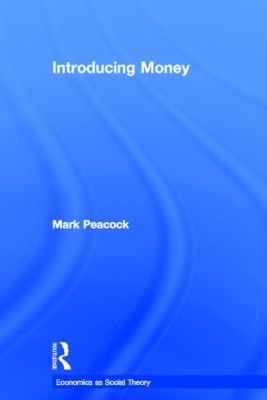
Introducing Money
Seiten
2013
Routledge (Verlag)
978-0-415-53986-9 (ISBN)
Routledge (Verlag)
978-0-415-53986-9 (ISBN)
This book provides a theoretical and historical examination of the evolution of money. It is distinct from the majority of ‘economic’ approaches, for it does not see money as an outgrowth of market exchange via barter. Instead, the social, political legal and religious origins of money are examined.
This book provides a theoretical and historical examination of the evolution of money. It is distinct from the majority of ‘economic’ approaches, for it does not see money as an outgrowth of market exchange via barter. Instead, the social, political, legal and religious origins of money are examined.
The methodological and theoretical underpinning of the work is that the study of money be historically informed, and that there exists a ‘state theory of money’ that provides an alternative framework to the ‘orthodox’ view of money’s origins.
The contexts for analysing the introduction of money at various historical junctures include ancient Greece, British colonial dependencies in the nineteenth and early twentieth century, and local communities which introduce ‘alternative’ currencies. The book argues that, although money is not primarily an ‘economic’ phenomenon (associated with market exchange), it has profound implications (amongst others, economic implications) for societies and habits of human thought and action.
This book provides a theoretical and historical examination of the evolution of money. It is distinct from the majority of ‘economic’ approaches, for it does not see money as an outgrowth of market exchange via barter. Instead, the social, political, legal and religious origins of money are examined.
The methodological and theoretical underpinning of the work is that the study of money be historically informed, and that there exists a ‘state theory of money’ that provides an alternative framework to the ‘orthodox’ view of money’s origins.
The contexts for analysing the introduction of money at various historical junctures include ancient Greece, British colonial dependencies in the nineteenth and early twentieth century, and local communities which introduce ‘alternative’ currencies. The book argues that, although money is not primarily an ‘economic’ phenomenon (associated with market exchange), it has profound implications (amongst others, economic implications) for societies and habits of human thought and action.
Mark Peacock is Associate Professor in the Department of Social Science, York University, Canada.
Introduction: Economics and History Part I: Theories 1. Carl Menger and the Exchange Theory of Money 2. The 'State' or 'Chartalist' Theory of Money Part II: Ancient Money 3. Money in the Ancient Near East: the 'Beginnings' 4. Money in Archaic Greece: Evidence from Homeric Epic 5. The Religious Origins of Money in 'Homeric Society' 6. 'The Value of a Man': Wergeld, Accounting and Archaic Law 7. Coinage and Money in Classical Greece Part III: Modern Monies 8. Monetization in Colonial Contexts: Famine, Class and Markets in 'Development' Strategies 9. The Moral Economy of Parallel Currencies: The Case of Local Exchange Trading Systems
| Erscheint lt. Verlag | 13.3.2013 |
|---|---|
| Reihe/Serie | Economics as Social Theory |
| Verlagsort | London |
| Sprache | englisch |
| Maße | 156 x 234 mm |
| Gewicht | 570 g |
| Themenwelt | Geschichte ► Teilgebiete der Geschichte ► Wirtschaftsgeschichte |
| Wirtschaft ► Allgemeines / Lexika | |
| Wirtschaft ► Volkswirtschaftslehre ► Wirtschaftspolitik | |
| ISBN-10 | 0-415-53986-2 / 0415539862 |
| ISBN-13 | 978-0-415-53986-9 / 9780415539869 |
| Zustand | Neuware |
| Haben Sie eine Frage zum Produkt? |
Mehr entdecken
aus dem Bereich
aus dem Bereich
die Ukraine, Polen und der Irrweg in der russischen Geschichte
Buch | Hardcover (2023)
C.H.Beck (Verlag)
28,00 €
eine Globalgeschichte des Kapitalismus
Buch | Hardcover (2023)
C.H.Beck (Verlag)
38,00 €


